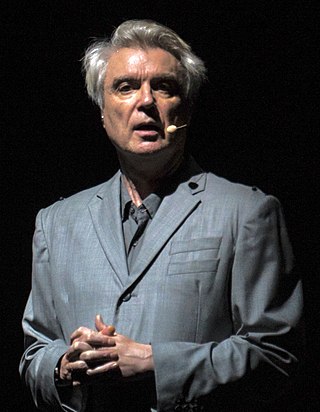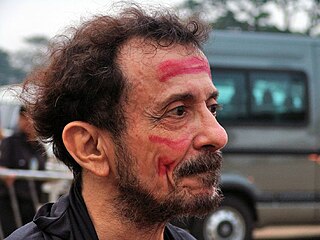Related Research Articles

David Byrne is a Scottish-American musician, writer, visual artist, and filmmaker. He was a founding member, principal songwriter, lead singer, and guitarist of the American new wave band Talking Heads.

John Zorn is an American composer, conductor, saxophonist, arranger and producer who "deliberately resists category". His avant-garde and experimental approaches to composition and improvisation are inclusive of jazz, rock, Jewish music, hardcore, classical, contemporary, surf, metal, soundtrack, ambient, and world music. Rolling Stone noted that "[alt]hough Zorn has operated almost entirely outside the mainstream, he's gradually asserted himself as one of the most influential musicians of our time".

Luaka Bop is a New York–based record label founded by musician David Byrne, former lead singer and guitarist for the art rock–new wave band Talking Heads. What began with Byrne making cassettes of his favorite Tropicália tracks for his friends became a full-fledged record label in 1988 after Byrne received a solo artist deal from Warner Bros.

Johnny Shuggie Otis is an American singer-songwriter, recording artist, and multi-instrumentalist.

Antônio José Santana Martins, known professionally as Tom Zé, is a Brazilian singer-songwriter, multi-instrumentalist, and composer who was influential in the Tropicália movement of 1960s Brazil. After the peak of the Tropicália period, Zé went into relative obscurity: it was only in the 1990s, when musician and Luaka Bop label head David Byrne discovered Zé's 1975 album Estudando o Samba and then released reissues of his work, that Zé returned to performing and releasing new material.

A.R. Kane is a British musical duo formed in 1986 by Alex Ayuli and Rudy Tambala. After releasing two early EPs to critical acclaim, the group topped the UK Independent Chart with their debut album 69 (1988). Their second album, "i" (1989), was also a top 10 hit. They were also part of the one-off collaboration MARRS, whose surprise dance hit "Pump Up the Volume" was released in 1987. Ayuli is believed to have coined the term "dreampop" in the late 1980s to describe their eclectic sound, which blended elements such as effects-laden guitars, dub production, and drum machine backing.

Michael Davis Pratt, known professionally as Jim White, is an American singer-songwriter, visual artist and author.

Susana Esther Baca de la Colina is a prominent Peruvian singer-songwriter, school teacher, folklorist, ethnomusicologist and three-time Latin Grammy Award winner. She has been a key figure in the revival of Afro-Peruvian music.
Geggy Tah is a band initially composed of writer/singer/bassist Tommy Jordan and keyboard/guitarist Greg Kurstin. Each of them has a younger sister who was unable to pronounce her brother's name when very young; "Geggy" and "Tah" were the baby girls' mispronunciations of their brothers' names. The band was known for its eclectic and playful live shows that featured both Jordan and Kurstin playing a wide array of instruments. David Byrne said that "Geggy Tah are so postmodern they've come out the other side...They incorporate so many disparate elements into their sound that one senses a new sensibility afoot, an inclusionary wave...like nothing I've heard before."

Los Amigos Invisibles is a Venezuelan band which plays a blend of disco, acid jazz and funk mixed with Latin rhythms. In addition to releasing eleven critically acclaimed albums, the band have been lauded internationally for their explosive, live shows, spanning nearly 60 countries. They are considered the Venezuelan band with the greatest international recognition.
Ambitious Lovers were a musical duo composed of guitarist/singer Arto Lindsay and keyboardist Peter Scherer, active from the mid-1980s to the early 1990s. Their music incorporated elements from Brazilian music and funk. Despite strong reviews from critics for their three albums, Ambitious Lovers found little success with mainstream audiences.

This article catalogs the ongoing discography of Scottish-American recording artist, composer, musician, and producer David Byrne, former singer for Talking Heads.
The +2s is a Brazilian band from Rio de Janeiro that composes samba but, at the same time, incorporates the sounds of funk and psychedelia into their music. The music group consists of Moreno Veloso, Domenico Lancelotti, and Alexandre Kassin. Each of them released a single album under their name with the suffix “+2” meaning “and two others”.

William Ezechukwu Onyeabor was a Nigerian funk musician and businessman. His music was widely heard in Nigeria in the late 1970s and early 1980s. Despite his success, he remained an enigmatic, private, and reclusive figure.
Ahmed Janka Nabay was a Sierra Leonean musician and a major figure in Bubu Music, a traditionally Temne music which is played by up to 20 musicians blowing into bamboo pipes of different sizes. He first earned attention after performing for an audition of SuperSound.

Delicate Steve is the stage name of musician Steve Marion, an American multi-instrumentalist who leads the band of the same name. Delicate Steve's sound has been described as hand-crafted with elements of progressive rock, folksy twang, African rhythms, surf rock and 1970s pop. Marion has collaborated with a wide range of artists in a variety of styles and genres, performing live and recording in-studio with artists such as The Black Keys, Paul Simon, Amen Dunes, Mac DeMarco, Tame Impala, and others.

Pamelia Stickney is an American theremin player. She has performed and recorded with many artists including David Byrne, Yoko Ono, Béla Fleck and the Flecktones, David Garland, Seb Rochford, Otto Lechner and Simone Dinnerstein, and was instrumental to the final design of Robert Moog's Etherwave Pro Theremin, for which she was the primary test musician. Kurstin has made various film, television and radio appearances, most notably on Saturday Night Live. and in the 2004 documentary Moog.

Inspiration Information is the third album by Shuggie Otis, who produced it and performed most of its instrumental parts. Released in 1974 on Epic Records, it reached number 181 on Billboard's Top 200 Pop Albums list, and its title track also reached number 56 on the U.S. R&B singles chart.

Who is William Onyeabor? is a 2013 compilation album by William Onyeabor released by Luaka Bop. The music was compiled by Uchenna Ikonne and was the first official re-issue of his music. Metacritic described the album as receiving "Universal acclaim" with Pitchfork citing it as one of the "best reissues" and NPR listing it as one of the best albums of 2013.
The term "world music," meaning folk music from around the world, has been credited to ethnomusicologist Robert E. Brown, who coined it in the early 1960s at Wesleyan University in Connecticut, where he developed undergraduate through doctoral programs in the discipline. To enhance the learning process, he invited more than a dozen visiting performers from Africa and Asia and began a world music concert series.
References
- ↑ Rubin, Mike, "An Elusive Mystery Man of Music: Archived 2017-01-21 at the Wayback Machine , The New York Times, November 15, 2013
- ↑ "Nine Months In Nigeria, One Brilliant, Difficult Funk Musician" Archived 2018-02-19 at the Wayback Machine , NPR.org, December 15, 2013
- ↑ Colletti, Justin, "NYC Indie Labels: Luaka Bop", SonicScoop, May 24, 2012
- ↑ Interview with Yale Evelev Archived 2016-09-14 at the Wayback Machine , Dust and Grooves, August 2012
- ↑ Interview: Yale Evelev Archived 2015-10-04 at the Wayback Machine , M magazine, October 1, 2015
- ↑ Gehr, Richard, "Luaka Bop: An Introduction" Archived 2016-09-15 at the Wayback Machine , Red Bull Music Academy Daily, April 15, 2015
- ↑ Walzer, Robert P., "Bringing the Bop Back Home," Archived 2016-09-17 at the Wayback Machine Wall Street Journal, September 1, 2011
- ↑ "Yale Evelev producer credits at Discogs.com". Archived from the original on 2016-10-09. Retrieved 2016-09-06.
- ↑ "Yale Evelev credits at AllMusic". Archived from the original on 2016-08-18. Retrieved 2016-09-06.